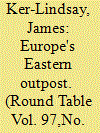|
|
|
Sort Order |
|
|
|
Items / Page
|
|
|
|
|
|
|
| Srl | Item |
| 1 |
ID:
141674


|
|
|
|
|
| Summary/Abstract |
A British decision to leave the European Union (in what has become known as a potential ‘Brexit’) could have a significant effect on the UK's relationship with the Western Balkans, argues James Ker-Lindsay. It would almost certainly reduce the country's influence over Bosnia and Herzegovina and its ability to shape the process of engagement between Serbia and Kosovo. At the same time, the UK would gain no material advantage in terms of its ability to handle other regional issues that may have a direct or indirect effect on Britain, such as illegal migration and the flow of fighters from the Balkans into Syria.
|
|
|
|
|
|
|
|
|
|
|
|
|
|
|
|
| 2 |
ID:
146430


|
|
|
|
|
| Summary/Abstract |
It is now generally understood that climate change poses a grave threat to international security. Rising temperatures will lead to droughts in large parts of Africa, while many low-lying countries in Europe and Asia face the prospect of catastrophic flooding. This is likely to lead to massive population displacement, food shortages, resource competition and an increased risk of conflict. And for one group of countries, the effects of global warming will be nothing short of apocalyptic. The Intergovernmental Panel on Climate Change (IPCC) estimates that oceans will rise between 26 and 82 centimetres by the end of this century. This means that, in the decades to come, there is a real chance that a number of island states in the Pacific and Indian oceans will be completely submerged. At present, the four countries most at risk are Kiribati, Maldives, the Marshall Islands and Tuvalu, with a combined population of around half a million people.
|
|
|
|
|
|
|
|
|
|
|
|
|
|
|
|
| 3 |
ID:
138346


|
|
|
|
|
| Summary/Abstract |
This article examines the extent to which states are able to interact at an official level with a contested or de facto state—a state that has unilaterally declared independence but is not a member of the United Nations—without being understood to have recognized it. This is an area of increasing interest and relevance to policy-makers as the number of contested states has grown in recent years. In many cases, interaction may be important for ongoing peace efforts. However, there are also instances when a state is prevented from recognizing the territory in question for specific domestic or foreign policy reasons and so has to find alternative means by which to cooperate. Drawing on several key examples, notably Kosovo and the ‘Turkish Republic of Northern Cyprus’, but also with reference to Abkhazia, the article explores the limits of interaction across various different forms of bilateral and multilateral diplomatic activity. As is shown, albeit with some significant provisos, legal theory and historic practice suggest that diplomatic engagement does not constitute recognition if there is no underlying intent to recognize. This means that there is in fact a very high degree of latitude regarding the limits of diplomatic engagement with contested states. This is especially the case in bilateral contexts. Indeed, in some circumstances, the level of engagement can even amount to recognition in all but name.
|
|
|
|
|
|
|
|
|
|
|
|
|
|
|
|
| 4 |
ID:
084591


|
|
|
|
|
| Publication |
2008.
|
| Summary/Abstract |
This article explores the relationship between the Republic of Cyprus and the Middle East. Although it is now a member of the European Union, geographically Cyprus was long viewed as a peripheral part of the Middle East. This has naturally created a certain ambiguity in terms of the relationship the island has with its regional neighbours. However, politics rather than geography has been the main force driving modern and contemporary relations. Throughout the Cold War, Cyprus was a member of the Non-Aligned Movement, along with many of the other countries of the region. Its relations with the region have also been shaped by its desire to prevent the Muslim Arab states from recognizing the Turkish Cypriot breakaway regime in northern Cyprus. In turn, these factors shaped Cyprus' views on a number of regional issues, including the Arab-Israeli conflict and the invasion of Iraq. Since it joined the EU, in May 2004, Cyprus has increasingly taken an equidistant approach on regional issues and increasingly sees itself as a bridge between Europe and the Middle East.
|
|
|
|
|
|
|
|
|
|
|
|
|
|
|
|
| 5 |
ID:
155064


|
|
|
|
|
| Summary/Abstract |
The role of Great Powers in processes of secession and recognition has attracted increasing attention from scholars in recent years. This analysis examines how Britain rallied international opposition to the November 1983 unilateral declaration of independence [UDI] of the “Turkish Republic of Northern Cyprus” [TRNC]. The British Government tried hard to prevent the UDI. Once it occurred, Britain led efforts to condemn the move. It resulted in United Nations Security Council Resolution 541, which declared the TRNC illegal and called on states not to recognise it. As well as exploring the diplomacy behind the counter-secession efforts, this examination also answers a long-standing question as to whether any countries aside from Turkey ever recognised the TRNC. It also challenges the widely held view amongst Greek Cypriots that Britain invariably supports the Turkish Cypriots on the Cyprus Problem.
|
|
|
|
|
|
|
|
|
|
|
|
|
|
|
|
| 6 |
ID:
080022


|
|
|
|
|
| Publication |
2007.
|
| Summary/Abstract |
New Democracy's victory in the March 2004 Greek elections immediately raised questions about the continued development of the process of rapprochement between Greece and Turkey, begun five years earlier in 1999. However, concerns were misplaced. The incoming administration made it clear that it intended to maintain the policy of détente. Like the previous PASOK government, it sought to minimise the role of Cyprus as a factor in bilateral relations and continued to support Turkey's membership of the European Union. The differences that have arisen between New Democracy and PASOK appear to be more a result of the differing styles of George Papandreou and Petros Molyviatis, the two foreign ministers, than of any significant disparity in basic foreign policy principles
|
|
|
|
|
|
|
|
|
|
|
|
|
|
|
|
| 7 |
ID:
077166


|
|
|
|
|
| Publication |
2007.
|
| Summary/Abstract |
This essay analyzes the views of the governments of Greece and Cyprus towards the question of Turkish membership in the European Union. Specifically, it shows that fundamental differences have emerged in the way in which the two perceive the benefits of Turkish engagement with the EU. For Greece, Turkish accession is seen as a transformative process. For the Greek Cypriots, the process of Turkish accession is viewed as a form of leverage. Moreover, and contrary to the prevailing view in certain quarters, there is no evidence of Greek collusion in Greek Cypriot thinking. Indeed, the ability of the Greek government to influence the Greek Cypriot leadership is rather limited.
|
|
|
|
|
|
|
|
|
|
|
|
|
|
|
|
| 8 |
ID:
122776


|
|
|
|
|
| Publication |
2013.
|
| Summary/Abstract |
When Kosovo declared independence, in February 2008, it was stated that the move was not an act of self-determination. Instead, the key states that supported the decision insisted that the case for statehood arose from a unique set of circumstances. Kosovo was not a precedent; it was a sui generis case in international politics. This essay considers the arguments underpinning this claim to exclusivity and argues that, taken either individually or collectively, the main justifications used to support Kosovo's 'unique' statehood-such as the abuse of human rights-in fact have serious consequences for other separatist conflicts elsewhere.
|
|
|
|
|
|
|
|
|
|
|
|
|
|
|
|
| 9 |
ID:
088753


|
|
|
|
|
| Publication |
2009.
|
| Summary/Abstract |
This article examines how the Republic of Cyprus has confronted the threat of international terrorism. Although the threat of terrorism in Cyprus remains relatively low, the Cypriot authorities have nevertheless sought to minimize the risk and maximize the level of preparedness. This has involved taking an uncompromising attitude toward those suspected of involvement with terrorist groups. At the same time, there has been a marked increase in the amount of international co-operation, especially since EU accession, in 2004. Nevertheless, shortcomings remain, particularly in terms of the legislative framework and the development of an analytical counterterrorism capability.
|
|
|
|
|
|
|
|
|
|
|
|
|
|
|
|
| 10 |
ID:
158097


|
|
|
|
|
| Summary/Abstract |
In June 2016, the UK voted to leave the European Union (EU). Although many issues shaped the Brexit campaign, the question of Turkey’s quest for EU membership emerged as an unexpectedly strong factor. This article examines how this happened and how the debate evolved. It shows that those who advocated leaving the EU not only distorted the prospect of Turkish membership, they also misrepresented British support for the country’s accession. While the UK had indeed been a strong advocate of Turkey’s EU integration in the past, support for enlargement in general had declined in recent years due to increasing voter concerns over immigration. However, the policy of supporting Turkish membership could not be wholly repudiated by the government, even in the name of campaigning to stay in the EU, as this would have damaged Britain’s strategic relationship with Turkey.
|
|
|
|
|
|
|
|
|
|
|
|
|
|
|
|
| 11 |
ID:
072900


|
|
|
|
|
| Publication |
2006.
|
| Summary/Abstract |
This article examines the UN Force in Cyprus (UNFICYP) following the failed attempt to reunite the island in April 2004. It reviews the post-referendum reduction in the size of the Force and analyses the prospects for further major changes to the mission in the future. Specifically, it argues that while any further significant alterations would appear unlikely in the near term, given the current positions of the main parties in the Security Council, a radical rethinking of the UNFICYP may well be possible, if not necessary, in the light of Turkey's progress towards EU membership.
|
|
|
|
|
|
|
|
|
|
|
|
|
|
|
|
|
|
|
|
|